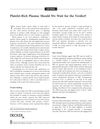
Enterococcus faecalis delays wound healing by disrupting cell functions and creating an anti-inflammatory environment.
 May 2024 in “Clinical Cosmetic and Investigational Dermatology”
May 2024 in “Clinical Cosmetic and Investigational Dermatology” Manipulating cell cleanup processes could help treat hair loss.
 April 2024 in “Archiv EuroMedica”
April 2024 in “Archiv EuroMedica” Platelet-Rich Plasma therapy helps increase hair density and regrowth for some types of hair loss.
April 2024 in “International journal of molecular sciences” Dermal factors are crucial in regulating melanin production in skin.
April 2024 in “Biomolecules” Exosomal miRNAs from stem cells can help improve skin health and delay aging.
Aesthetic rehabilitation techniques can improve life quality and wellbeing for disabled patients.
March 2024 in “Biomedicines” Mesenchymal stem cells show promise for effective skin repair and regeneration.
September 2023 in “Animals” Hair follicle development in cashmere goats involves dynamic changes in proteins and metabolites, with key roles for oxytocin, MAPK, and Ca2+ pathways.
 August 2023 in “Military Medical Research”
August 2023 in “Military Medical Research” Scientists have improved 3D models of human skin for research and medical uses, but still face challenges in perfectly replicating real skin.
 June 2023 in “Frontiers in Bioengineering and Biotechnology”
June 2023 in “Frontiers in Bioengineering and Biotechnology” The conclusion is that accurately replicating the complexity of the extracellular matrix in the lab is crucial for creating realistic human tissue models.

Different genes cause Female Pattern Hair Loss compared to male hair loss, and treatments vary, but more research is needed to understand it fully.
 May 2023 in “Frontiers in Cell and Developmental Biology”
May 2023 in “Frontiers in Cell and Developmental Biology” The document concludes that using stem cells to regenerate hair follicles could be a promising treatment for hair loss, but there are still challenges to overcome before it can be used clinically.
 May 2023 in “International Journal of Molecular Sciences”
May 2023 in “International Journal of Molecular Sciences” Mesenchymal stem cells could help treat radiation-induced bladder damage but more research is needed to overcome current limitations.
January 2020 in “Indian Journal of Pharmaceutical Sciences” Natural products show promise for new hair loss treatments.
November 2022 in “Clinical, Cosmetic and Investigational Dermatology” The combined treatment for hair loss is effective, easy to use, and has mild side effects.
 1 citations,
May 2014 in “European Journal of Inflammation”
1 citations,
May 2014 in “European Journal of Inflammation” A lotion with minoxidil, hydrocortisone butyrate, and 17a-estradiol can improve or stabilize Frontal Fibrosing Alopecia in some cases, but there's no universally-accepted treatment yet.
 55 citations,
July 2016 in “Dermatologic Therapy”
55 citations,
July 2016 in “Dermatologic Therapy” Multiple treatments work best for hair loss.
 8 citations,
February 2022 in “Vascular Health and Risk Management”
8 citations,
February 2022 in “Vascular Health and Risk Management” Some skin conditions may increase the risk of heart disease, and understanding their connection could lead to better treatments.
 25 citations,
January 2002 in “Folia Pharmacologica Japonica”
25 citations,
January 2002 in “Folia Pharmacologica Japonica” Minoxidil helps hair grow by improving blood flow and increasing growth factors in hair follicles.
 2 citations,
January 2015 in “BioMed Research International”
2 citations,
January 2015 in “BioMed Research International” Growth factor treatments are increasingly used in medicine but require more research to fully understand their mechanisms.
 31 citations,
July 2015 in “Clinical, Cosmetic and Investigational Dermatology”
31 citations,
July 2015 in “Clinical, Cosmetic and Investigational Dermatology” Hair restoration surgery effectively treats hair loss with natural-looking results, using techniques like stem cells and platelet-rich plasma.
 4 citations,
May 2014 in “Journal of Cutaneous Medicine and Surgery”
4 citations,
May 2014 in “Journal of Cutaneous Medicine and Surgery” Platelet-rich plasma may help with wound healing, hair growth, and skin rejuvenation, but more research is needed to prove its effectiveness.
 1 citations,
October 2023 in “European journal of histochemistry”
1 citations,
October 2023 in “European journal of histochemistry” Ozone and procaine boost the release of healing factors in platelet-rich plasma.
 October 2023 in “Microorganisms”
October 2023 in “Microorganisms” Nirmatrelvir/Ritonavir treatment may lead to a weaker immune response to COVID-19, but doesn't affect the chance of rebound.
30 citations,
October 2013 in “BMC dermatology” VEGF gel increases hair growth but may have potential toxicity.
 28 citations,
August 2014 in “Journal of Assisted Reproduction and Genetics”
28 citations,
August 2014 in “Journal of Assisted Reproduction and Genetics” The VEGF +405G allele may increase the risk of PCOS in South Indian women.
 23 citations,
July 1996 in “Archives of Dermatological Research”
23 citations,
July 1996 in “Archives of Dermatological Research” bFGF, VEGF, and minoxidil decrease collagen production in hair cells, possibly affecting hair growth.
 22 citations,
December 2017 in “International Journal of Molecular Sciences”
22 citations,
December 2017 in “International Journal of Molecular Sciences” Minoxidil boosts hair growth by increasing blood flow and nutrients to hair follicles.
 19 citations,
January 2016 in “Biological & Pharmaceutical Bulletin”
19 citations,
January 2016 in “Biological & Pharmaceutical Bulletin” Sargassum muticum extract and its component apo-9'-fucoxanthinone may help hair growth and treat hair loss.
 7 citations,
December 2015 in “Experimental Dermatology”
7 citations,
December 2015 in “Experimental Dermatology” Sh-Polypeptide 9 may be better than minoxidil for hair growth and protection against damage.






















